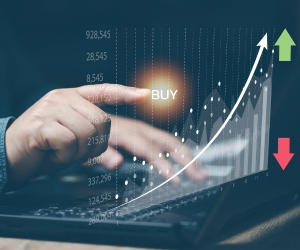HOW TO INVEST IN MASTERCARD STOCK
Mastercard is a global payment technology company, known for its wide range of payment solutions and services. It is listed on the New York Stock Exchange (NYSE), a crucial platform for financial technology companies. Is it a good investment then? Are there ups and downs? What investment strategy should I use with the stock? This article will answer these questions and more.

Steps to Invest in Mastercard
Research and Analysis:
Mastercard is one of the leading payment processing companies worldwide, with a business model based on transaction fees. Its growth is driven by the rise of digital commerce and the global shift to cashless payments. Before investing in MA, review its financial reports, transaction volume growth, developments in digital payments, and its strategy in cryptocurrencies and fintech.Opening an Investment Account:
Mastercard is listed on the NYSE under the ticker MA. To invest in its shares, you need to open an account with a brokerage firm that has access to the US market. Depending on the broker, you can buy full or fractional shares, making it easier to invest with less capital. They will typically require a copy of identification and a utility bill (for example, from an electric or water company) to verify your identity and address. Compare the fees, trading platforms, and service offered by each brokerage to choose the one that best suits your needs.Defining the Investment Strategy:
As a large-cap stock with stable growth, Mastercard is attractive for long-term investors seeking exposure to the expansion of the electronic payments sector. It's also an option for short-term trading, as its volatility increases during earnings reports, regulatory changes, or announcements of new partnerships with banks and fintechs.Execution and Monitoring:
Mastercard competes with companies like Visa (V), PayPal (PYPL), and American Express (AXP). It's key to monitor metrics such as payment volume processed, expansion in emerging markets, and participation in blockchain technologies and real-time payments.Portfolio Diversification:
To balance risks, you can diversify with shares of other digital payment companies, global banks, or fintech ETFs like FINX (Global X FinTech ETF) or IPAY (ETFMG Prime Mobile Payments ETF). You can also consider Mastercard within a growth and dividend stock portfolio.
SWOT Analysis of Mastercard as an Investment
We will evaluate the investment in Mastercard through a SWOT analysis, which allows us to identify the internal and external factors affecting its performance in the global digital payments sector.
Strengths:
Leadership in the payment sector: Mastercard is one of the leading payment networks globally, with an extensive network and a strong brand.
Innovation in financial technology: The company invests in digital solutions that facilitate secure and efficient transactions, adapting to market trends.
Broad customer base: Its network of customers, including both consumers and merchants, allows it to diversify its revenue.
Financial strength: The ability to generate stable cash flows supports its investment and expansion capabilities.
Weaknesses:
Exposure to technological competition: The fast evolution in the fintech sector can present challenges in maintaining its leadership position.
Dependence on the digital ecosystem: Dependence on digital infrastructure and the internet makes the company vulnerable to technological disruptions and cyber threats.
Regulatory complexity: Operating in multiple jurisdictions involves regulatory challenges that may increase compliance costs.
Opportunities:
Growth of digital payments: The expansion of e-commerce and the digitalization of global consumption generate greater demand for payment services.
Innovation in security services: Developing advanced payment security solutions can strengthen trust and expand its user base.
Expansion in emerging markets: Penetration into new markets and geographic diversification can increase its income sources.
Threats:
Growing competition: The entry of new players and fierce competition in the sector can affect its margins and market share.
Cyber risks: The increasing incidence of cyber-attacks can impact transaction security and consumer trust.
Global economic instability: International crises can affect transaction volumes and, consequently, its income.
What is an International Stock Broker?
An International Stock Broker is the entity (or platform) that allows you to buy and sell shares of companies listed on stock exchanges in different countries around the world. Unlike a local brokerage firm, the main focus of International Brokers is to offer access to global markets, such as the US, European, or Asian markets.
Why do we need an International Stock Broker?
Investing in international stocks can be an excellent way to diversify your portfolio, as it gives you the opportunity to participate in the growth of economies and sectors worldwide. However, operating in global markets is not as straightforward as doing so in the local market: it requires specific knowledge, compliance with international regulations, and the use of advanced trading platforms.
An International Stock Broker gathers all these investment opportunities in one place and allows you to access different exchanges and trading conditions, in exchange for a commission.
Examples and comparisons:
There are several well-known International Stock Brokers, such as Interactive Brokers, eToro, TD Ameritrade, or Saxo Bank, among others. Each offers trading platforms with particular features and commissions that vary according to the service. Some stand out for providing market analysis and advice in multiple languages, while others may offer more competitive operating costs or social investment tools. These details allow you to choose the option that best suits your needs and investor profile.
Regulatory and security aspects
It's essential that the International Stock Broker you choose is regulated by recognized entities in the country where it operates, like the U.S. Securities and Exchange Commission (SEC) in the United States, the Financial Conduct Authority (FCA) in the United Kingdom, or the Securities Commission (CVM) in Brazil, among others. This oversight ensures that the broker adheres to strict security and transparency standards, providing you with greater confidence when investing your money.
How do Brokers "connect" to International Markets?
Through agreements with foreign stock exchanges and the use of advanced technological platforms, International Stock Brokers process the buy and sell orders placed by their clients. They sort the transactions based on price, order of arrival, and other parameters, and charge a commission when the transaction is executed. This technological infrastructure allows operations to be carried out quickly and securely, facilitating real-time tracking of your investments.
In conclusion, an International Stock Broker is your gateway to the world's most important stock markets. Thanks to its regulation, trading platforms, and knowledge of global markets, you can diversify your portfolio and seek growth opportunities in different sectors and countries.








